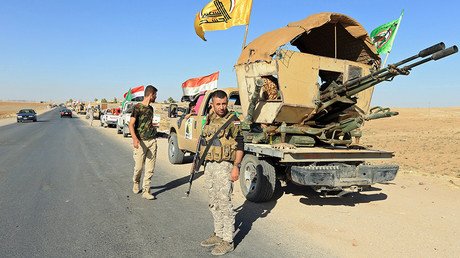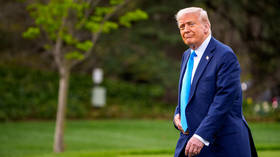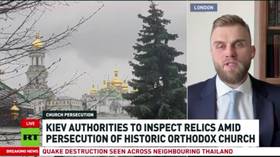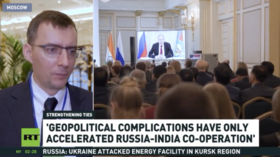‘Why would Washington punish us?’ Resigning Iraqi Kurdistan leader accuses US of betrayal
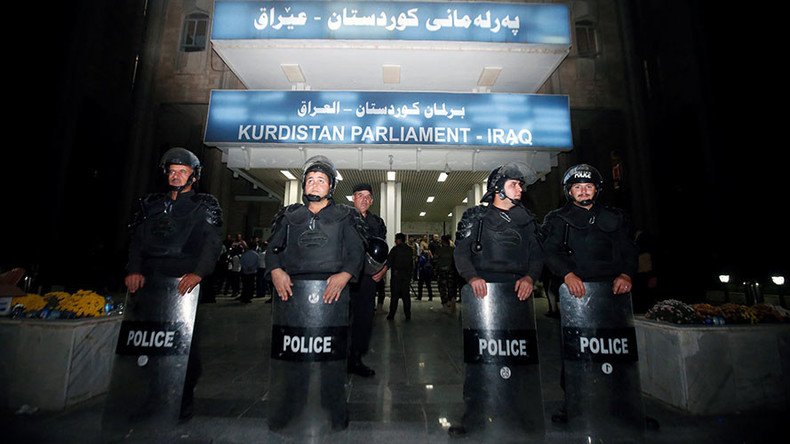
The US has failed to back the Kurds, who were their close allies in the fight against ISIS terrorists, and has allowed Baghdad to use American weapons in its attack on Kurdistan, Masoud Barzani, the Iraqi Kurdish President, has said after resigning his post.
“Nobody stood up with us other than our mountains,” Barzani said in a televised address Sunday after the Kurdish parliament endorsed his resignation request.
He was referring to Baghdad’s military operation launched on October 16 following the Kurdish referendum. The vast majority had supported the region’s independence from Iraq in the September plebiscite.
The departing Kurdish leader denounced the US for abandoning the Kurds and allowing American Abrams tanks, which were supplied to Iraqi forces to fight Islamic State, to be deployed against them. “Without the help of Peshmerga(Kurdish fighters), Iraqi forces could not have liberated Mosul from ISIS (Islamic State, IS) alone,” he pointed out as cited by Reuters.
“Our people should now question, whether the US was aware of Iraq's attack and why they did not prevent it,” Barzani said.“Why would Washington want to punish Kurdistan?” he reflected in disbelief.
He then accused his Kurdish rivals of “high treason” for handing over the strategic oil-rich city of Kirkuk and surrounding areas to Iraqi forces without a fight. “We tried to stop bloodshed but the Iraqi forces and Popular Mobilization Front (Shia militias) kept advancing, using US weapons,” he said.
The veteran politician said further that Baghdad’s unwillingness to engage in dialogue showed that “Iraq no longer believes in Kurdish rights.” As for the September 25 referendum he had masterminded, Barzani said “three million votes for Kurdistan independence created history and cannot be erased.”
“I am the same Masoud Barzani, I am a Peshmerga (Kurdish fighter) and will continue to help my people in their struggle for independence,” he declared.
Earlier, the 71-year-old leader, who has lead the Kurdistan Regional Government (KRG) since its inception in 2005, sent a letter to parliament asking for his presidency not to be extended after November 1.
The MPs voted on the request in Erbil Sunday, with 70 voices supporting Barzani’s resignation and 23 voting against the move, Rudaw and Kurdistan 24 channels reported.
Tensions were running high in the Kurdish capital as demonstrators, some of whom were armed, stormed the parliament building during the session. Reuters reported that the protesters said they wanted to “punish” the deputies, who, according to them, had “insulted” Barzani. Gunshots were also heard outside parliament, with reports emerging of the crowd also attacking journalists.
Kurdish independence ‘a thing of the past’ – Iraq, 61k flee Kirkuk – UN https://t.co/yKedfIVilzpic.twitter.com/XOmiTf0DGm
— RT (@RT_com) October 18, 2017
Prior to the independence referendum, the Kurds fought alongside Iraqi forces in their US-backed campaign against Islamic State terrorists. Washington regarded the Kurds as a major ally, supplying the Peshmerga with arms despite strong objections from its NATO ally, Turkey.
READ MORE: Iraqi forces clash with Kurds moving closer to regional capital Erbil (VIDEO)
On Sunday, Iraqi forces and the Peshmerga launched a second round of talks aimed at resolving the conflict. Iraqi prime minister, Haider al-Abadi, earlier demanded the Kurds cancel the results of the independence vote; and hand control of border crossings between the Kurdish region and Iran, Syria and Turkey, through which oil flows, to Baghdad.
